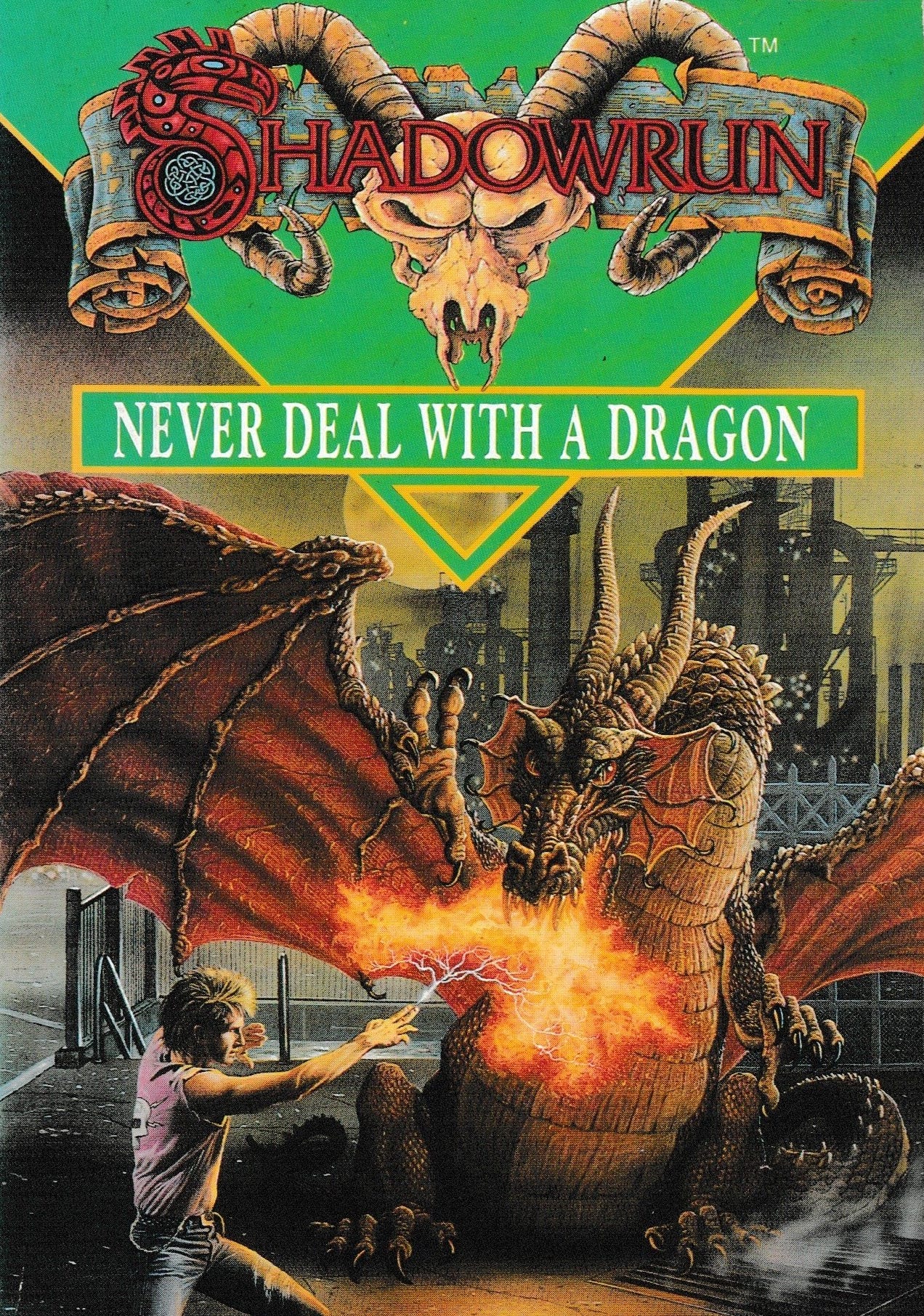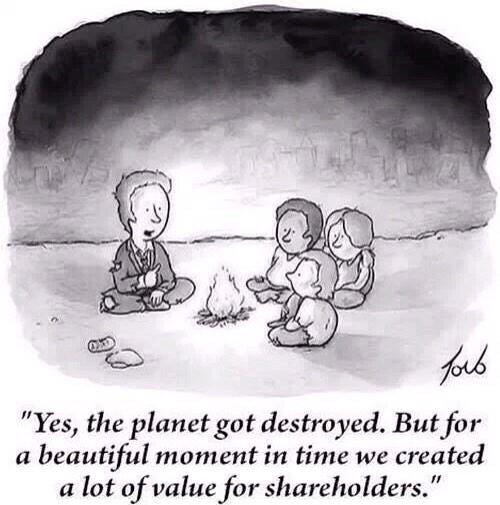Facebook And The Art and Science of Making Deals With Dragons.
Living that Faustian Life
Welcome Back to Trenchant Edges, where we speculate about how information technology is really the philosopher’s stone.
Estimated reading time: 7 minutes, 25 seconds. Contains 1484 words
Yesterday we discussed how Information Technology is designed to progressively condition behavior to extend its own reach powered by capitalism and surveillance-based prediction markets. Seriously, The Age of Surveillance Capitalism is so good.
Today we tackle the subject from the opposite direction. Can an individual prevent themselves from being hacked? Is freedom and agency possible within a pervasive surveillance system?
Can you be free in an unfree world?
But first, a ham-fisted pop culture reference because if I write this without a thumbnail, social media sites won’t share the link at all.
Making Deals With A Dragon

This image comes from the delightful tabletop roleplaying game Shadowrun, where you do crimes in a corporate dystopia to try to buy yourself another couple days or weeks of comfortable living before you have to again run from bullets and the police to earn your keep.
Oh, and there are literal giant reptile dragons and magic. And, uh, maybe racism allegories that haven’t aged gracefully (But hey, native Americans overthrew the USA and retook about 2/3rds of North America which is rad). None of that really matters here, because the whole point of the game is while you shouldn’t deal with dragons, you’re gonna have to sooner or later.
So we’ve got to talk about metaphorical dragons here. A Dragon in this context isn’t only the giant flying lizard monsters of legend, but really any kind of power-seeking being on the casual side of a power imbalance with you.
The classic Dragon in the western canon is the Devil. But in this context, the devil’s creator God is just as much of a Dragon, just with a different set of values.
Dragons are less of a kind of individual and more an environmental hazard. Remember the first Godfather movie? The opening scene is one of the great depictions of a dragon in action.
Shadowrun repeats the phrase, “Never Deal With A Dragon”, not because dragons are untrustworthy, but because you produce power by grinding up human beings.
And no one with a little power wastes it unless to gain greater power. That’s how you stay powerful. Incidentally, while many on the left insult Nancy Pelosi or Chuck Schumer for their intransigence, but they’re merely protecting their turf as anyone who expects to stay powerful must. They’re playing out their own careers and mostly with consummate skill.
Dragons are not evil. Most aren’t even sadists. They’re all cruel, of course, but that’s a waste product rather than the point.
The word is amoral.
Not so much seeking harm as not minding if it happens to occur.
So, now we’ve got to step back and imagine a Dragon that isn’t a person with a position of power or influence, but a system. That’s trickier, a person you can woo or understand. You can speak heart to heart with a person, even a heartless person.
But a system has nothing like a heart so your entreaties must work differently.
Facebook as dragon and my phone addiction
It’s no surprise Facebook is that second kind of Dragon. All corporations are, in a sense, Faustian bargains. Legal fictions, that is, persons created by saying the magic words and paying a fee to the state to handle the magic of empowering their accounts with life within the tax code.
I like the word Dragon better than Demon here because it’s a bit more emotionally complex than the usual depiction of the denizens of hell.
Corporations, as Milton Friedman argued, cannot have morality. All they can really see is profit and loss. The rules governing their operation impose an obligation to seek the former and avoid the latter, whatever the costs accrue to others. Peace and limited liability be upon you. Externalities be damned.
It’s this logic, combined with a market built around shuffling the ledgers around for who’s going to pay for what that drives the *checks notes* global industrial processes that currently threaten the very goddamn biosphere itself.
Cool.
This whole Faustian thing is working out great.
There’s a lot to be said about the way corporations literally generate profit by squeezing lifeforce out of their employees and customers as a literal description of a pact with a devil, but one can only indulge in that kind of rhetorical fancy for so long without trying to find an old priest and a young priest or going a little mad.
So what’s the solution?
Well, in absence of, uh, a class-conscious and organized working class seizing the means of production and operating them democratically… well, we’ve got to play defense.
Carving Out a Little Space For Yourself
Used to be all you had to do to get away from the system was buy some land in Idaho and start sawing off shotguns for federal informants (OK, that one didn’t work great for Randy Weaver), but now we all carry multiple tracking devices with us at all times.
So it’s not so easy.
We’re going to be simplifying things here. Trying to escape our commercial panopticon more or less means walling yourself off from a lot of services and culture. It’s been the worst enclosure of the commons by private interests in hundreds of years in the US, I’m less confident elsewhere.
The most important rule here is understanding the deal. Right now we allow information about ourselves to be rendered into metadata to make it easier for companies to try and discover how to sell us shit in exchange for varying degrees of utility and an emotion pump.
A lot of people think of this as a dopamine loop hack, but that’s only the reward side, the stuff that makes operant conditioning work (mostly). But social media is more of a full spectrum assault on our emotions. It’s there to provoke whatever reaction it can.
The important thing is the uncertainty of what your next act of engagement with the system could be. Are you about to comment something that gets you fired or introduces you to the person you’ll marry and spend the rest of your life with?
They’re both tantalizingly possible.
So, the obvious choice is to avoid these services entirely. Get a dumb phone and some maps, keep it off unless you’re making calls. But I don’t really want to talk about the technical solutions, because they can be pretty janky.
This section is for people who 1. Want to deal with the beast and 2. Want to do it as much on their own terms as possible.
First we understand the score: The system will attempt to manipulate us and will collect any data it can, no matter what it says about privacy, to do a better job manipulating us.
Second, we find ways of carving out space on acceptable terms. Facebook Groups are a favorite of mine, at least for the moment. It’s a mostly linear feed on a specific topic with a moderated group of people. You can have real and excellent conversations there.
You can work with that.
Of course, that freedom works just as well for nazis as it does for me. So it’s no great surprise that facebook is undermining it.
The next step is knowing exactly what you want to do and what you won’t accept. After this ban, I’m at a place where I no longer want to be on FB in any meaningful sense.
I don’t want to immediately jump ship, but I plan on withdrawing over the next six months.
Being banned because the algorithm couldn’t tell the difference between criticizing genocidal thinking and promoting it even after a human reviewed the post and agreed it wasn’t bad was a step too far.
If I can’t have the kind of conversations I want on FB what’s the fucking point of being there?
The other side is the discipline of becoming more conscious of the ways FB pushes you towards unconsciousness.
Why are you scrolling? What do you want to get out of it? Try setting a timer and see how easy it is to disengage. Scrolling the feed induces a kind of human-machine fugue state, a kind of un-meditation.
In a way, I’m grateful to facebook for this month ban. It’s forced me to reevaluate my habits on their platform and ask serious questions about its viability in my life.
Right now, so much of my social life flows through messenger that I haven’t even really spent less time on FB. Though, it has made it easier to get into this writing groove, which is nice.
What I like about facebook is the ability to package up some of my thoughts and see how other people react to them. It’s useful and fun feedback.
I feel like I’ve got way more to say on this subject, but I’ve suddenly got a social life again? Super weird. I dunno.
The world needs some kind of anti-gamification manifesto. Or something.
We’ll see.


I left fb except for medical support groups a while back. By left, meaning I deleted every piece of my content from my profile, unliked/unfollowed/left everything, all deleted. it already hated how I was forcing it to behave before that, but this really freaked it out, it's funny to see how it acts different. If you're feeling petty, you can change your name pronunciation to FUK ZUK with no trouble...
Anyways- really enjoying this series, I haven't thought about that book in like 25 years didn't know it was a game? Also, Do you have a telegram channel?